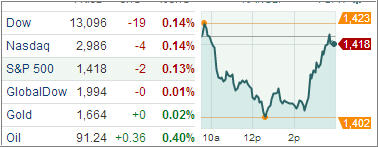Just as the major market indexes were about to violate their psychologically important milestones, that is 13,000 for the Dow and 1,400 for the S&P 500, news broke that there will be another fiscal cliff meeting forthcoming, as the House told their members to show up for work Sunday night at 6:30 pm.
That’s all it took, and one look at the above chart tells the story as to the exact moment the desperately needed assist was thrown. While the S&P 500 still ended up slightly in the red, it could have been a lot worse as the indexes were down by over 1%, but thanks to the last hour lift-a-thon, the inevitable was postponed again.
I for one can’t wait to see if this will be another face saving attempt supported by useless jawboning or if there is some seriousness to this upcoming Sunday night drama. I still believe that it will take a major setback in the markets, say in the range of 20%, which eventually will force the hands of the politicians to reacquaint themselves with the meaning of the word ‘compromise.’
In the meantime, a watered down proposal that does not address all issues but merely postpones them, is a distinct possibility, elevating the sport of can kicking to new heights.
In any event, the late-session bounce came after Majority Leader Eric Cantor said in a twitter message the House will assemble in the evening of Dec 30. Stocks had slumped earlier after Senate Majority Leader Harry Reid said prospects for an agreement before January 1 seemed unlikely as Republicans won’t cede ground.
Treasury Secretary Tim Geithner sent a letter to Congress late Wednesday warning that the federal debt limit will reach on December 31, and the Treasury Department will start using “extraordinary measures” to finance $200 billion in deficits to prevent borrowing from exceeding the legal limit.
Concerns over the fiscal cliff have already taken a toll on US consumer sentiment as hopes for a meaningful budget deal have slowly diminished. The Conference Board’s index of confidence, a gauge of American consumer confidence, fell to 65.1 from 71.5 in the prior month, well below the 70 reading forecast by Bloomberg survey.
Treasury prices edged up for a second straight session, pushing yields to their lowest level in two weeks after Senate Majority Leader Harry Reid said the budget impasse probably won’t be resolved by year-end, deflating hopes that Washington could avert going over the fiscal cliff that threatens to push the economy back into recession next year.
Our Trend Tracking Indexes (TTIs) changed only slightly with the Domestic one now at +1.18% and the International one at +6.90%.
Contact Ulli
